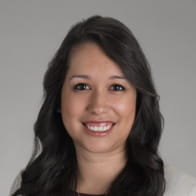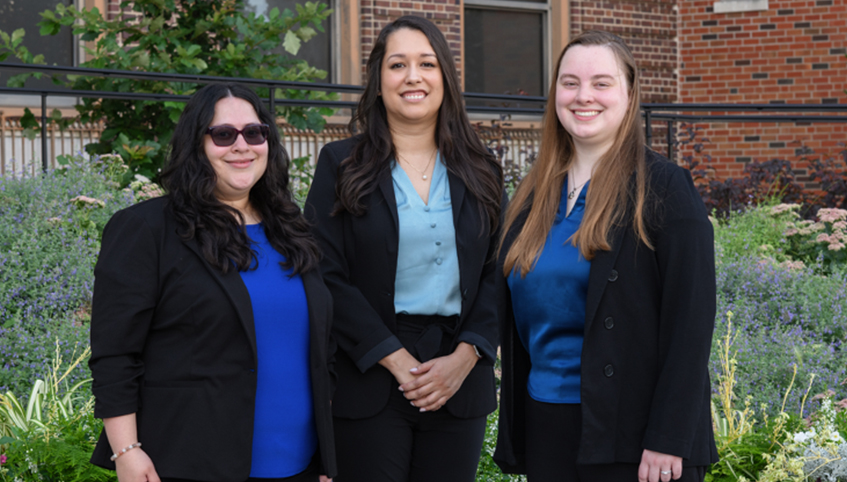- Home
- Professionals
- Residency Programs and Fellowships
- Pharmacy Residency
- Pharmacy Residency in Kansas City
- Ambulatory Care Pharmacy Residency


The postgraduate year-2 (PGY2) ambulatory care pharmacy residency at The University of Kansas Health System is designed to provide year-1 (PGY1) graduates the opportunity to accelerate growth beyond generalist practice and further the development of practice specific to the needs of ambulatory patients. The resident will have already achieved a basic level of competency commensurate with that of a PGY1 pharmacy practice resident. The PGY2 residency focuses on developing the knowledge, attitudes, training and skills necessary to cultivate pharmacists who are competent and compassionate practitioners who are prepared for a role as an ambulatory care pharmacist.
Graduates of the residency have the capability to design, implement and secure collaborative interdisciplinary practice agreements necessary for establishment and ongoing management of ambulatory practice. Graduates are empowered to treat and appropriately triage the most complex chronic and acute illnesses presented by ambulatory patients while providing care within the context of a long-term healthcare partnership with patients and healthcare providers that emphasizes health improvement and disease prevention. Completion of the PGY2 ambulatory care pharmacy residency will provide the practitioner the advanced critical thinking skills and clinical knowledge necessary to practice as an ambulatory care pharmacotherapy expert, enhance ambulatory care services as a clinical coordinator and/or share skills with others by serving as an adjunct faculty member. Moreover, program graduates will be primed for ambulatory practice leadership to serve as experts in prescribing medication.
Completion of this residency program prepares pharmacists for a wide variety of ambulatory care positions. Previous residents have taken positions as pharmacists in primary care clinics, specialty clinics such as gastroenterology, rheumatology and HIV, and assumed teaching roles with colleges of pharmacy and residency programs.
PGY2 residency programs build upon a Doctor of Pharmacy (PharmD) education and PGY1 pharmacy residency training to develop pharmacist practitioners with knowledge, skills and abilities as defined in the educational competency areas, goals and objectives for advanced practice areas. Residents who successfully complete PGY2 residency programs are prepared for advanced patient care or other specialized positions and board certification in the advanced practice area, if available.



(she/her)
Hometown: McAllen, Texas
Pharmacy School: Texas Southern University
PGY1 Residency: Texas Southern University College of Pharmacy and The University of Texas Medical Branch (UTMB) – Houston, Texas
Clinical Interests: Endocrinology, heart failure, primary care
Hobbies: Playing video games, reading, paint by numbers
Why I chose The University of Kansas Health System: I chose The University of Kansas Health System because it offered unique clinical experiences that would help shape me into a skilled and well-rounded ambulatory care pharmacist. During the interview process, I soon realized how amazing the preceptors were and knew this was the best place for me to continue my training, learning from the best.

(she/her)
Hometown: Overland Park, Kansas
Pharmacy School: University of Kansas
PGY1 Residency: Indiana University Health
Clinical Interests: Academia/Precepting, Transplant, Cystic Fibrosis
Hobbies: Playing board/card/D&D games with friends, reading and creative writing, and watching movies/TV with my fiancé
Why I chose The University of Kansas Health System: The wide array of opportunities across primary care and specialty clinics, precepting and research opportunities, and the welcoming atmosphere at my interview. I am excited to be back home in Kansas!
The PGY2 ambulatory care pharmacy residency is tailored to the interests and career goals of each resident. A variety of practice settings is available.
PGY2 Ambulatory Care Supplemental Manual
The PGY2 ambulatory care pharmacy residents are required to complete the following learning experiences for the coordinating durations:
Residents are required to complete two comprehensive care clinic rotations and one specialty care clinic rotation from the options listed below. All rotations are six weeks in length.
In comprehensive care clinics, the pharmacist evaluates the complete patient and not a specific disease or medication. While they may focus on a disease state, within their scope they provide care for majority of the patient’s diseases.
In specialty care clinics the pharmacist provides care to patients with a focus on a specialized disease. While they may evaluate the complete patient, the focus is on a specific disease or set of diseases.
Residents will have a longitudinal clinic experience. The resident will spend their first 6-week rotation (introduction to longitudinal) in this area and will continue one full day per week throughout the remainder of the year.
Additional opportunities may be available based on the schedule and interests of the resident.
| Learning experience | Required vs. elective | Duration |
| Orientation | Required | 4 weeks |
| Introduction to longitudinal: rheumatology (continued longitudinal) | Required | 6 weeks |
| Research | Required | 1 week |
| Specialty care clinic: multiple sclerosis | Required | 6 weeks |
| Comprehensive care clinic 1: primary care | Required | 6 weeks |
| Comprehensive care clinic 2: solid organ transplant | Required | 6 weeks |
| Research | Required | 1 week |
| Specialty care elective: dermatology | Elective | 6 weeks |
| Ambulatory leadership | Required | 4 weeks |
| Comprehensive care elective: cystic fibrosis | Elective | 6 weeks |
| Specialty care elective: pulmonology | Elective | 6 weeks |
| Learning experience | Required vs. elective | Duration |
| Orientation | Required | 4 weeks |
| Introduction to longitudinal clinic: primary care (continued longitudinal) | Required | 6 weeks |
| Research | Required | 1 week |
| Specialty care clinic: epilepsy | Required | 6 weeks |
| Comprehensive care clinic 1: cardiology | Required | 6 weeks |
| Comprehensive care clinic 2: HIV | Required | 6 weeks |
| Research | Required | 1 week |
| Specialty care elective: IBD | Elective | 6 weeks |
| Ambulatory leadership | Required | 4 weeks |
| Comprehensive care elective: cystic fibrosis | Elective | 6 weeks |
| Comprehensive care elective: solid organ transplant | Elective | 6 weeks |
The PGY2 ambulatory care resident will work in The University of Kansas Health System outpatient pharmacy one of every four weekends (Saturday and Sunday), one major and one minor holiday.
National Matching Services (NMS) code: 752665

We are an equal employment opportunity employer without regard to a person’s race, color, religion, sex (including pregnancy, gender identity and sexual orientation), national origin, ancestry, age (40 or older), disability, veteran status or genetic information.